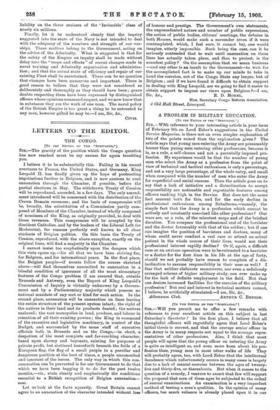A PROBLEM IN MILITARY EDUCATION.
[TO THE EDITOR OT THE " SPECTATOR."
Szu,—With reference to your interesting article in your issue of February 8th on Lord Esher's suggestions in the United Service Magazine, is there not an even simpler explanation of two of the points raised than the explanation given ? The article says that young men entering the Army are presumably keener than young men entering other professions, because it is, as a rule, a self-chosen and not a parentally imposed pro- fession. My experience would be that the number of young men who select the Army as a profession from the point of view of technical and tactical enthusiasm is only a percentage, and not a very large percentage, of the whole entry, and small when compared with the number of men who enter the Army for superficial and social reasons. Then the article goes on to say that a lack of initiative and a disinclination to accept responsibility are noticeable and regrettable features among officers ranking high in the Service. But does not the same fact account both for this, and for the early decline in professional enthusiasm among Subalterns,—namely, the simple fact that the Army is a profession which cannot be actively and constantly exercised like other professions ? Our wars are, as a rule, of the minutest scope and of the briefest duration. You compare the professional zeal of the barrister and the doctor favourably with that of the soldier ; but if one can imagine the position of barristers and doctors, many of whom could never conduct a real case or attend an actual patient in the whole course of their lives, would not their professional interest rapidly decline P Or if, again, a difficult case or an anxious operation were to be entrusted to a barrister or a doctor for the first time in his life at the age of forty, should we not probably have reason to complain of a dis- inclination to assume responsibility in their ease as well ? I fear that neither elaborate manceuvres, nor even a sedulously arranged scheme of higher military study, can ever make up for the lack of definite employment in the field. Not that one desires increased facilities for the exercise of the military profession! But zeal and interest in technical matters cannot, I believe, be artificially stimulated.—I am, Sir, &c.,




































 Previous page
Previous page